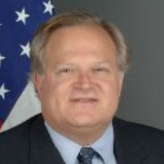Officials
Back to Officials


Offical

Name: Schwartz, Eric
Current Position: Former Assistant Secretary
With refugee crises unfolding on every inhabited continent, the State Department Bureau of Population, Refugees and Migration has its work cut out for it. Bureau Director Eric P. Schwartz, who was confirmed June 19, 2009, has broad experience with humanitarian and refugee issues, especially as compared to his predecessor, Ellen Sauerbrey, whose experience in such matters was limited.
Born August 9, 1957, in Syosset, New York, Schwartz has been aware of and in sympathy with the problems of refugees and immigrants since his childhood, having grown up listening to the stories of his grandfather, who emigrated from Romania at the turn of the twentieth century. Schwartz earned a B.A. in Political Science from the State University of New York at Binghamton in 1979, a law degree from New York University School of Law in 1985, and a Master of Public Affairs degree (with a specialization in International Relations) from the Woodrow Wilson School at Princeton University in 1985. After graduation from SUNY-Binghamton, Schwartz interned for the Carnegie Endowment for International Peace along with Jeff Merkley, now a Democratic senator from Oregon. At the end of their term, they decided to backpack and bus through Central America, speaking only Spanish and sitting separately on buses so they could talk to Central Americans.
After earning his graduate degrees, Schwartz served as Washington Director of the human rights organization Asia Watch (now known as Human Rights Watch-Asia). He left that position in 1989 to serve as Staff Consultant to the U.S. House of Representatives Foreign Affairs Subcommittee on Asian and Pacific Affairs, where he remained through 1993. In 1993, Schwartz joined the Clinton Administration as a staff member on the National Security Council, eventually rising to the post of Senior Director and Special Assistant to the President for Multilateral and Humanitarian Affairs. He played a central role in managing administration responses on a range of peacekeeping, humanitarian and refugee issues, including U.S. support for and involvement in the international, UN-mandated deployment in East Timor, the U.S. train and equip program for West African troops in Sierra Leone, the rescue of Kurdish refugees from Northern Iraq, the resettlement of Vietnamese boat people, the safe haven program for Haitian refugees and U.S. relief efforts in Central America and Kosovo.
Although he might have expected to be appointed to a key foreign policy post in a Gore administration, George W. Bush’s election in 2000 forced Schwartz out of the executive branch in 2001. From 2001 through 2003, he held fellowships at the Woodrow Wilson Center, the U.S. Institute of Peace and the Council on Foreign Relations, completing articles and book chapters on peace operations, humanitarian issues, and refugee policy. As a senior fellow at the Council on Foreign Relations, he directed the Independent Task Force on Post-Conflict Iraq, working closely with Ambassador Thomas Pickering and James Schlesinger, co-chairs of the Task Force. During this period, he also served as a contributor to the Responsibility to Protect Project of the International Commission on Intervention and State Sovereignty.
In 2003, Mr. Schwartz served at the UN Office of the High Commissioner for Human Rights (UNHCHR). In the year following High Commissioner Sérgio Vieira de Mello’s August 2003 assassination in Baghdad, Iraq, Schwartz served as second-ranking official at UNHCHR headquarters, overseeing a variety of planning and budget activities during an exceptionally difficult transition period. Between 2005 and 2007, he served as UN Secretary-General Kofi Annan’s Deputy Special Envoy for Tsunami Recovery. In that role, he worked under the UN’s Special Envoy, former President Bill Clinton, to promote coordination, accountability to donors and beneficiaries, and best practices in the recovery effort. Also during that period, he served as a lead expert for the Congressionally-mandated Mitchell-Gingrich Task Force on United Nations Reform. In 2007, Schwartz was named Executive Director of the Connect U.S. Fund, a non-profit initiative focused on foreign and international affairs. He has been a Visiting Lecturer of Public and International Affairs at the Woodrow Wilson School at Princeton University for some time.
Schwartz and his wife, Catherine M. Graham, have two daughters, Sarah and Anna . A Democrat, Schwartz has contributed $4,050 to Democratic candidates, including $2,300 in 2007 to Jeff Merkley, $500 to Hillary Clinton in early 2008, $1,000 to Barack Obama in late 2008, and $250 to David Orentlicher, who ran unsuccessfully for the Democratic nomination to represent Indiana’s Seventh District in Congress.
Eric Schwartz Profile (WhoRunsGov)
Refugee Issues (interview with Eric P. Schwartz)
Testimony Before the Subcommittee on Near Eastern and South and Central Asian Affairs of the Senate Foreign Relations Committee on the Humanitarian Crisis in Pakistan (pdf)America's Eroding Global Leadership (by Samuel R. Berger and Eric P. Schwartz, New York Times Op-Ed)
- Latest News
- D.C. Public Schools will Teach all Second-Graders to Ride a Bike
- New Rule in Germany Limits Sales of Sex-Themed E-Books to 10pm to 6am
- What Happened to the 6-Year-Old Tibetan Boy the Chinese Government Kidnapped 20 Years Ago?
- U.S. Ambassador to Turkey Photoshops his Hair Color to Mock Turkish Mayor
- Mystery Artist Calls Attention to Unfixed Potholes by Drawing Penises around Them





